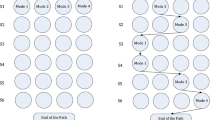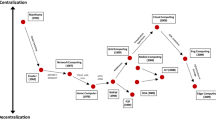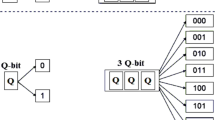Abstract
The use of parallel and distributed models of evolutionary algorithms (EAs) is widespread nowadays as a means to improve solution quality and reduce computational times when solving hard optimization problems. For this purpose, emergent computational environments such as P2P networks and desktop grids are offering a plethora of new opportunities but also bring new challenges: functioning on a computational network whose resources are volatile requires fault tolerance and resilience to churn. In this work we analyze these issues from the point of view of island-based EAs. We consider two EA variants, genetic and multimemetic algorithms, and analyze the impact on them of design decisions regarding the logical interconnection topology among islands and the particular fault-management policy used. To be precise, we have conducted an extensive empirical evaluation of five topologies (ring, von Neumann grid, hypercube and two kinds of scale-free networks) and four policies (including checkpoint creation and population reinitialization variants) on four benchmark problems, considering three different scenarios of increasing resource volatility. The statistical analysis of the results underlines the inherent fault-tolerance of these EAs and indicates that, while checkpointing is the most robust strategy and is superior in the most fragile topologies, a seemingly simpler guided reinitialization strategy provide statistically comparable results on the top-performing topologies, namely von Neumann grids and hypercubes.
Similar content being viewed by others
References
Alba, E.: Parallel Metaheuristics: A New Class of Algorithms. Wiley-Interscience (2005)
Alba, E., Luque, G.: Evaluation of parallel metaheuristics. In Luís Paquete, Marco Chiarandini, and Dario Basso, editors, Workshop on Empirical Methods for the Analysis of Algorithms – EMAA 2006, pp. 9–14, Reykjavik, Iceland (2006)
Alba, E., Tomassini, M.: Parallelism and evolutionary algorithms. IEEE Trans. Evol. Comput. 6(5), 443–462 (Oct 2002)
Alba, E., Troya, J.M.: Influence of the migration policy in parallel distributed GAs with structured and panmictic populations. Appl. Intell. 12(3), 163–181 (2000)
Albert, R., Barabási, A.: Statistical mechanics of complex networks. Rev. Modern Phys. 74(1), 47–97 (Jan 2002)
Baluja, S., Davies, S.: Using optimal dependency-trees for combinatorial optimization: Learning the structure of the search space. In: 14th International Conference on Machine Learning, pages 30–38. Morgan Kaufmann (1997)
Barabási, A., Albert, R.: Emergence of Scaling in Random Networks. Science 286(5439), 509–512 (1999)
Erick, C.: Efficient and Accurate Parallel Genetic Algorithms. Kluwer Academic Publishers, USA (2000)
Cantú-Paz, E.: Migration policies, selection pressure, and parallel evolutionary algorithms. J. Heuristics 7(4), 311–334 (July 2001)
Deb, Kalyanmoy, Goldberg, D.E.: Analyzing deception in trap functions. In: Whitley, L. D. (ed.) Second Workshop on Foundations of Genetic Algorithms, pp. 93–108, Morgan Kaufmann (1993)
Derrac, J., García, S., Molina, D., Herrera, F.: A practical tutorial on the use of nonparametric statistical tests as a methodology for comparing evolutionary and swarm intelligence algorithms. Swarm Evol. Comput. 1(1), 3–18 (2011)
Gagné, C., Parizeau, M., Dubreuil, M.: Distributed beagle: An environment for parallel and distributed evolutionary computations. In: Proceedings of the 17th Annual International Symposium on High Performance Computing Systems and Applications (HPCS) 2003, pp. 201–208, Sherbrooke (QC), May 11-14 (2003)
Arenas, M.G., Collet, P., Eiben, A.E., Jelasity, M., Merelo Guervós, J.J., Paechter, B., Preuß, M., Schoenauer, M.: A framework for distributed evolutionary algorithms. In Juan J. Merelo Guervós, Panagiotis Adamidis, Hans-Georg Beyer, José Luis Fernández-Villacañas Martín, and Hans-Paul Schwefel, editors, PPSN, Vol. 2439 of Lecture Notes in Computer Science, pp. 665–675. Springer (2002)
David, E.: Goldberg, Kalyanmoy Deb, and Jeffrey Horn. Massive multimodality, deception, and genetic algorithms. In: Parallel Problem Solving from Nature – PPSN II, pages 37–48, Brussels. Elsevier, Belgium (1992)
Gorges-Schleuter, M.: ASPARAGOS: an asynchronous parallel genetic optimization strategy. In: Schaffer, J. D. (ed.) Third International Conference on Genetic Algorithms, pp. 422–427. Morgan Kaufmann, San Francisco, CA (1989)
Hart, W.E., Krasnogor, N., Smith, J.E.: Recent Advances in Memetic Algorithms, volume 166 of Studies in Fuzziness and Soft Computing, chapter Memetic Evolutionary Algorithms, pages 3–27. Springer-Verlag, Berlin Heidelberg (2005)
Hidalgo, J.I., Lanchares, J., Fernández de Vega, F., Lombraña, D.: Is the island model fault tolerant? In Proceedings of the 9th Annual Conference Companion on Genetic and Evolutionary Computation, GECCO ’07, pages 2737–2744. ACM, NY, USA (2007)
Holm, S.: A simple sequentially rejective multiple test procedure. Scand. J. Stat. 6, 65–70 (1979)
Krasnogor, N., Blackburne, B.P., Burke, E.K., Hirst, J.D.: Multimeme algorithms for protein structure prediction. In J.J. Merelo et al., editors, Parallel Problem Solving From Nature VII, volume 2439 of Lecture Notes in Computer Science, pages 769–778. Springer-Verlag, Berlin (2002)
Laredo, J.L.J., Bouvry, P., González, D.L., Fernández, F., De Vega, M., Arenas, G., Guervós, J.J.M., Fernandes, C.M.: Designing robust volunteer-based evolutionary algorithms. Genet. Program Evolvable Mach. 15(3), 221–244 (2014)
Laredo, J.L.J., Castillo, P.A., Mora, A.M., Guervós, J.J.M., Fernandes, C.M.: Resilience to churn of a peer-to-peer evolutionary algorithm. IJHPSA 1(4), 260–268 (2008)
Larrañaga, P., Jose, A.L.: Estimation of Distribution Algorithms, volume 2 of Genetic Algorithms and Evolutionary Computation. Springer US (2002)
Lee, E.T., John, W.W.: Statistical Methods for Survival Data Analysis. Wiley Inc., Hoboken, NJ (2003)
Liu, C., White, R.W., Dumais, S.: Understanding web browsing behaviors through weibull analysis of dwell time. In: Proceedings of the 33rd International ACM SIGIR Conference on Research and Development in Information Retrieval, SIGIR ’10, pp. 379–386. ACM, NY, USA (2010)
González, D.L., De Vega, F.F., Casanova, H.: Characterizing fault tolerance in genetic programming. Futur. Gener. Comput. Syst. 26(6), 847–856 (2010)
González, D.L., Laredo, Juan L.J., De Vega, F.F., Guervós, J.J.M.: Characterizing fault-tolerance of genetic algorithms in desktop grid systems. In Peter Cowling and Peter Merz, editors, Evolutionary Computation in Combinatorial Optimization, volume 6022 of Lecture Notes in Computer Science, pages 131–142. Springer Berlin Heidelberg (2010)
González, D.L., Laredo, J.L.J., De Vega, F.F., Guervós, J.J.M.: Characterizing fault-tolerance in evolutionary algorithms. In Francisco Fernández de Vega, José Ignacio Hidalgo Pérez, and Juan Lanchares, editors, Parallel Architectures and Bioinspired Algorithms, volume 415 of Studies in Computational Intelligence, pages 77–99. Springer (2012)
Lozano, J.A., Larrañaga, P.: Iñaki Inza, and Endika Bengoetxea. Towards a New Evolutionary Computation, volume 192 of Studies in Fuzziness and Soft Computing. Springer Berlin Heidelberg (2006)
Melab, Nouredine, Mezmaz, Mohand: and El-Ghazali Talbi. Parallel hybrid multi-objective island model in peer-to-peer environment. In: Proceedings of the 19th IEEE International Parallel and Distributed Processing Symposium (IPDPS’05) - Workshop 6 - Volume 07, IPDPS ’05, pp. 190.2. IEEE Computer Society, Washington, USA (2005)
Milojičić, D.S., Kalogeraki, V., Lukose, R., Nagaraja, K., Pruyne, J., Richard, B., Rollins, S., Xu, Z.: Peer-to-peer computing. Technical Report HPL-2002-57. Hewlett-Packard Labs (2002)
Moscato, P.: On Evolution, Search, Optimization, Genetic Algorithms and Martial Arts: Towards Memetic Algorithms. Technical Report Caltech Concurrent Computation Program, Report, Vol. 826. California Institute of Technology, Pasadena, California, USA (1989)
Neri, F., Cotta, C., Moscato, P.: Handbook of Memetic Algorithms, volume 379 of Studies in Computational Intelligence. Springer-Verlag, Berlin Heidelberg (2012)
Nogueras, R., Cotta, C.: Analyzing meme propagation in multimemetic algorithms, Initial investigations. In: Proceedings of the 2013 Federated Conference on Computer Science and Information Systems, pp. 1013–1019. IEEE Press, Cracow, Poland (2013)
Nogueras, R., Cotta, C.: An analysis of migration strategies in island-based multimemetic algorithms. In T. Bartz-Beielstein, J. Branke, B. Filipič, and J. Smith, editors, Parallel Problem Solving From Nature – PPSN XIII, number 8672 in Lecture Notes in Computer Science, pp. 731–740. Springer, Berlin Heidelberg (2014)
Nogueras, R., Cotta, C.: A study on multimemetic estimation of distribution algorithms. In T. Bartz-Beielstein, J. Branke, B. Filipič, and J. Smith, editors, Parallel Problem Solving From Nature – PPSN XIII, number 8672 in Lecture Notes in Computer Science, pages 322–331. Springer, Berlin Heidelberg (2014)
Martin Pelikan, Sastry, Kumara, Cantú-Paz, E.: Scalable Optimization via Probabilistic Modeling, volume 33 of Studies in Computational Intelligence. Springer Berlin Heidelberg (2006)
Pettey, C.B., Leuze, M.R., Grefenstette, J.J.: A parallel genetic algorithm. In: Proceedings of the Second International Conference on Genetic Algorithms on Genetic Algorithms and Their Application, pages 155–161. L. Erlbaum Associates Inc, NJ, USA (1987)
Quade, D.: Using weighted rankings in the analysis of complete blocks with additive block effects. J. Am. Stat. Assoc. 74, 680–683 (1979)
Sarmenta, L. F.G.: Bayanihan: Web-based volunteer computing using java. In Yoshifumi Masunaga, Takuya Katayama, and Michiharu Tsukamoto, editors, Worldwide Computing and Its Applications – WWCA’98, volume 1368 of Lecture Notes in Computer Science, pages 444–461. Springer Berlin Heidelberg (1998)
Sato, Y., Sato, M.: Parallelization and fault-tolerance of evolutionary computation on many-core processors. In: IEEE Congress on Evolutionary Computation, pages 2602–2609. IEEE (2013)
Skolicki, Z., Jong, K.D.: The influence of migration sizes and intervals on island models. In: Genetic and Evolutionary Computation Conference 2005, pages 1295–1302, New York. ACM, NY (2005)
Smith, J.E.: Self-adaptation in evolutionary algorithms for combinatorial optimisation. In Carlos Cotta, Marc Sevaux, and Kenneth Sörensen, editors, Adaptive and Multilevel Metaheuristics, volume 136 of Studies in Computational Intelligence, pages 31–57. Springer Berlin Heidelberg (2008)
Smith, J.E.: Self-adaptative and coevolving memetic algorithms. In Ferrante Neri, Carlos Cotta, and Pablo Moscato, editors, Handbook of Memetic Algorithms, volume 379 of Studies in Computational Intelligence, pages 167–188. Springer-Verlag, Berlin Heidelberg (2012)
Stutzbach, D., Rejaie, R.: Understanding churn in peer-to-peer networks. In Proceedings of the 6th ACM SIGCOMM Conference on Internet Measurement, IMC ’06, pages 189–202. ACM, NY, USA (2006)
Reiko, T.: Distributed genetic algorithms. In 3rd International Conference on Genetic Algorithms, pages 434–439. Morgan Kaufmann Publishers Inc, CA, USA (1989)
Watson, R.A., Hornby, G.S., Pollack, J.B.: Modeling building-block interdependency. In Agoston E. Eiben, Thomas Bäck, Marc Schoenauer, and Hans-Paul Schwefel, editors, Parallel Problem Solving from Nature – PPSN V, volume 1498 of Lecture Notes in Computer Science, pages 97–106. Springer-Verlag, Berlin Heidelberg (1998)
Watts, D.J., Strogatz, S.H.: Collective dynamics of ’small-world’ networks. Nature 393, 440–442 (1998)
Waloddi, W.: A statistical distribution function of wide applicability. J. Appl. Mech. 18(3), 293–297 (1951)
Author information
Authors and Affiliations
Corresponding author
Additional information
This work is partially supported by Ministerio de Ciencia e Innovación project ANYSELF (TIN2011-28627-C04-01), by Junta de Andalucía project DNEMESIS (P10-TIC-6083) and by Universidad de Málaga, Campus de Excelencia Internacional Andalucía Tech.
Rights and permissions
About this article
Cite this article
Nogueras, R., Cotta, C. Studying Fault-Tolerance in Island-Based Evolutionary and Multimemetic Algorithms. J Grid Computing 13, 351–374 (2015). https://doi.org/10.1007/s10723-014-9315-6
Received:
Accepted:
Published:
Issue Date:
DOI: https://doi.org/10.1007/s10723-014-9315-6




